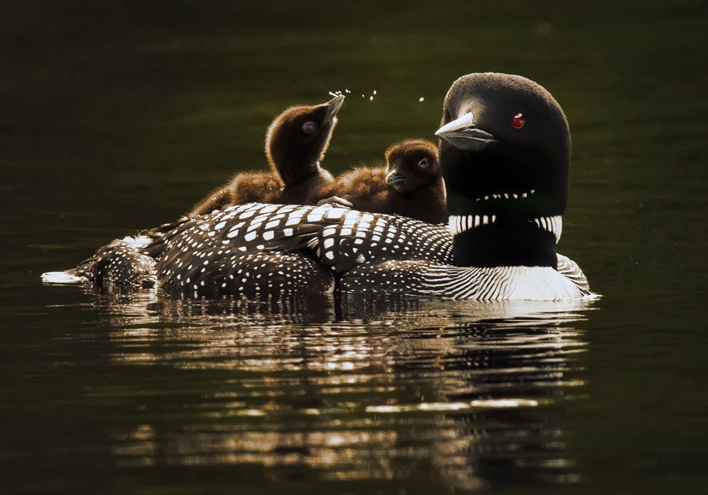WATER, the most important and, frequently, the most taken for granted resource in the world. The earth is 71% water; however, only 3% of that water is potable or drinkable. Of that 3%, 30% is ground water and only 0.3% surface water. Every living entity requires water to survive, and this resource is fast becoming depleted. While Minnesotans are using less water indoors due to more energy efficient appliances, we are using more water outside for irrigation. This increased water consumption carries with it increased environmental effects, costs and conflicts.
In the face of these increases, there is a great potential for more conservation by everyone, whether individual, community or business. Voluntary action for more efficient water usage practices as well as governmentally mandated actions will all serve to protect this valuable resource.

Loons (Minnesota state bird) and her young. Photo by Brian Peterson - Star Tribune
What you can do
The first place to start conserving water is in the home. Here are some simple measures we can each take to reduce consumption and eliminate waste. They are largely common sense and require little in the way of monetary output but are more a matter of change in our way of thinking and habits.
- Collect rainwater in a barrel or cistern.
- Build a rain garden and divert rainwater runoff towards it.
- Test soil moisture before watering and only water when necessary.
- Water lawn less frequently and more deeply.
- Adjust all irritation systems outlets so you are not watering the pavement.
- Do not water in the heat of the day.
- When planting, group together plants that require similar light and moisture conditions to reduce the need for additional watering.
- Plant drought tolerant plant material and/or install a meandering dry creek bed to utilize rainwater runoff for irrigation.
- Use mulch for moisture retention.
- Use drip irrigation systems as opposed to overhead sprinklers.
- Keep lawn free of weeds. Healthy lawns require less watering.
- Mow higher and less frequently. Mow your lawn to maintain 3 inches or so in height.
- Use a broom to clean pavement, not the hose.
- Do not use the sprinkler just to cool off or for play, combine these activities with lawn and garden watering.
- When washing your car, only have the hose on for initial wetting and final rinsing; or use commercial car wash, where they are required by law to recycle water.
- Use shut off nozzles on all hoses and faucets.
Our awareness of what needs to be done and greater public commitment and governmental responsibility at the local, state and national levels will go a long way to changing our wasteful practices and ensure adequate clean water supplies for future generations. Check out the links below to learn more about how YOU can help:
- Water Conservation for residential homes from the Minnesota DNR.
- Water Saving Strategies from the University of Minnesota Extension.
- Dakota County Soil and Water Conservation District.
The Gerten Experts are always available to answer your questions!
